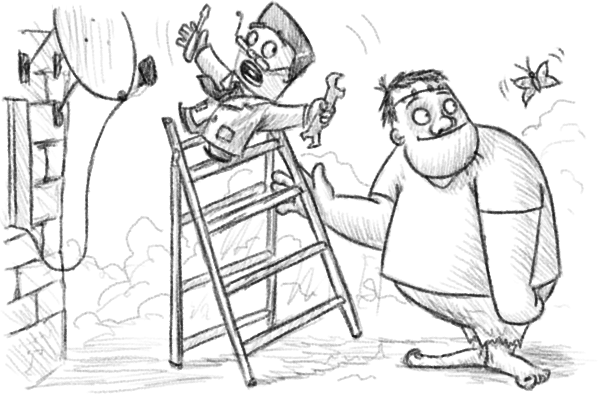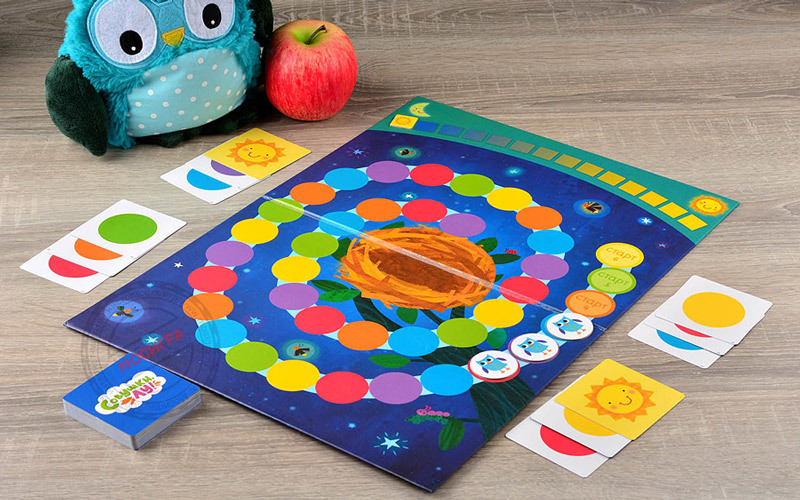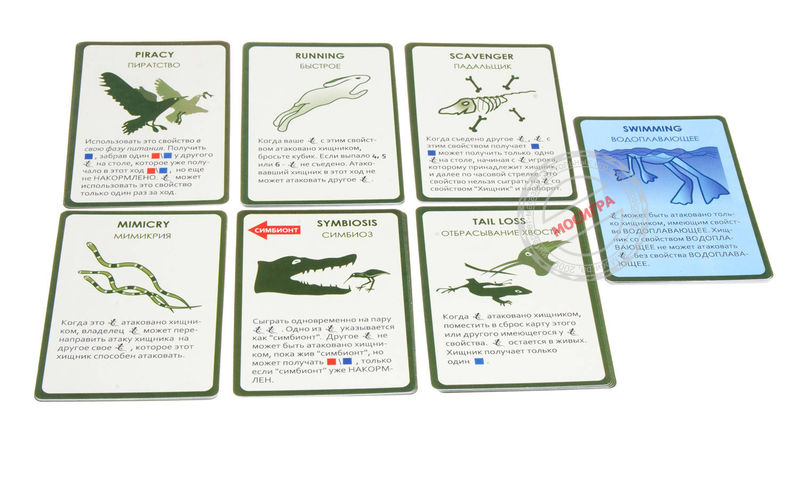Weird team games

Let's talk about sociopaths today. And about their opposites - team players.
I had the game “Sovushki, ay” , and I felt everything acutely. It is a team, and is made so that only those who work for the common good can win in it. And often making tactically disadvantageous moves, but strategically promising. If the idea is understood by another player.
In fact, here is a classic case of players vs environment. Time after time, the cruel rules of the game hit the fingers painfully, pushing to the thought that the poor birds can survive in this cruel world only together. Children should cooperate and understand what each of them does. After several batches, the children retract and, happily wowing, try to build as long chains as possible in order to pull out the laggards.
')
But only adults are subject to intelligible rules. The kids are crazy.

Here is the game "Sovushki, ay!". The main task is to have time to move all owls to the nest before the sun rises. There are no chips, all are common. The game goes on a common field, where a path to the nest is marked in a spiral with colored circles. Players drop cards with different colors, after which the owl figure can be moved to the nearest sector of the corresponding color. This is a basic strategy. A distinctive feature of this game is the ability to jump over a chain of other owls if they cover all sectors of the same color.

The game teaches altruism and teamwork. In reality, everything is faced with the peculiarities of human psychology. Children do not obey the logic and rules. Imagine an ordinary family with two brothers, 3 and 5 years old, who are always competing with each other. Classic PvP ends with the transition to the individual and finishing off the winner with something wooden. It would seem that switching to PvE should solve the problem, since it puts everyone on one side of the barricades. If you hope that everything will go quietly and calmly - forget it.
The youngest in 3 years at first happily plays conditionally getting into the rules, but then decides that his own version is more interesting. It looks wonderful. At that moment, when the parent, wrinkling his forehead, calculates the optimal strategy for delivering a distant owl to the nest, taking into account the number of cards left, the cub under the joyful “Uhhhu!” Falls face to the playing field, scattering everything on the carpet. This is half the trouble. Somewhere in half an hour you realize that the eldest child in a fit of misanthropy plays for the wrong team . In a sense, for the cruel nature. In every possible way interferes with the progress of the chicks, choosing the most inconvenient cards in anticipation of "when their sun burns."
When smart adults design their games, they usually expect that each player will follow the strategy that gives him the maximum winnings. And the more difficult it is to predict the behavior of irrational players, the main motive of which is the destruction of the system simply from protest. And strictly within the rules.
Economists have already broken their teeth about this problem. All their lives they proceeded from the principle that every economic agent strives for optimization. That is, business is trying to act as efficiently as possible. But no shit. The Nobel Prize in Economics in 2017 was awarded to Professor of the University of Chicago Richard Thaler - "for his contribution to the study of behavioral economics." Richard Thaler revealed a pattern in that when making financial decisions, people are guided not by logic, but by momentary moods. Two people with exactly the same income, but from different sources, will spend money differently.
Why be social at all?
It helps survival. Long millennia prepared us for the fact that not only the strongest, but the most social survive. This fact has always been a driving force in capturing living space from Homo Sapiens. You are not too friendly tribe, and each quietly eats his piece of fried gopher, hiding behind a palm tree? Congratulations. Tomorrow you will be your
In altruism and compassion much less sublime than it may seem. In fact, it is based on a very pragmatic basis. Primitive tribes fingered a bunch of strategies, trying to feed themselves in difficult years, when the mammoth crop failure. There was no stable food source if you were not lucky enough to live among bananas somewhere in equatorial Africa. Food appeared sporadically and usually in large chunks. For example, a dead goat. Or even a deer. And so, at that very moment, when the hunter drove the stick of the evil hyenas away from the fatty carcass, the Choice appeared. You can eat everything yourself, but a large part of the prey will simply disappear. With refrigerators then it was complicated. And it was possible to give a piece of the leg to an old bald shaman, from which the hunter is pretty shitty.
The most interesting began further. An individual that shared its resources during the period of local abundance could count on sharing with her in response when hunger came. Moreover, this strategy did not focus only on food. The same feeble shaman could suggest which mushrooms to eat, and from which you can see rainbow deer and talk to ancestors. The more members of the tribe survived thanks to social mutual assistance, the easier it was for everyone individually. Then the division of labor, the arms race, the steam machine and the iPhones gradually grew from such a strategy.
So, compassion is an extremely selfish strategy, it just brings benefits in the long term, in contrast to the option “to seize the entire resource only for oneself”.
When you're just different
A bit of madness in this idyll of social mutual help is made by sociopaths. And those who use the defaults of "command" and "sociality", those who are also called social hackers.
These are such strange people who have something unconsciously or maliciously broken in terms of interaction with others. That is, they of course interact and are very pleased with this, only those around them still shudder for several more hours. They are often not evil. Just different. Well-established game strategies designed for ordinary people often work with them very unexpectedly. It is especially fun to watch when such a character appears in the party and breaks the whole system to hell.

For example, in Evolution with a rather high threshold of entry for inexperienced players. The game was created by the candidate of biological sciences, therefore the scientific background of the game is very correct. In the process of the party, players are trying in every way to collect poisonous flying brontosaurus with mimicry and anti-missile suppression systems from pathetic, all despised shrimp. The game pushes for strategic thinking, planning of food resources, fat reserves and in general to a balanced development. Experienced players often come to a certain balance between themselves, when competition is more like a peaceful division of food niches.
Everything becomes much more complicated when a sociopathic player appears, whose behavior cannot be predicted. Because of his inability to interact, he often chooses those strategies that ultimately lead to general hunger and subsequent extinction. The tragedy of the communities as it is. Especially enchanting situation is obtained when such characters go on the warpath and arrange vendetta contrary to common sense. Then a whole fan of evil asocial strategies appears - from the option “spread the crowd of zerg, let them eat all the food and die together with the enemy,” to especially sophisticated ones like infecting a powerful enemy with a parasite, which will eat it for a long time from the inside, and then die all the same.
Why? Two factors:
- Priorities. Short-term benefits and incentives may be more important than long-term ones. And then the whole coherent strategy comes down forest.
- Insufficient planning horizon. If the player does not see the situation for several moves ahead, then it works by analogy to the greedy path finding algorithm. It can also be optimal in the conditions of lack of information or computing resources. When you do not understand what is happening around you at all and who all these people are, the ultimate strategy of selfishness and aggression becomes the best strategy, even to the detriment of yourself. Here only in the long run it often ends sadly.

Here there is a model and a toy about how important it is to be social and to be friends. And what strategies of trust-distrust should be used in different societies. She explains a lot in matters of sociality. The Russian version is here: Evolution of trust .
As you can see, our society has turned out to be compassionate, ready to help and polite - selfishly more profitable for our own survival. And the extension of the kind. Therefore, there are games that teach this. And also because when a child learns to play correctly in a team, he can be taught to break the opponent’s strategy, taking advantage of the vulnerabilities of social defaults.
Source: https://habr.com/ru/post/352596/
All Articles